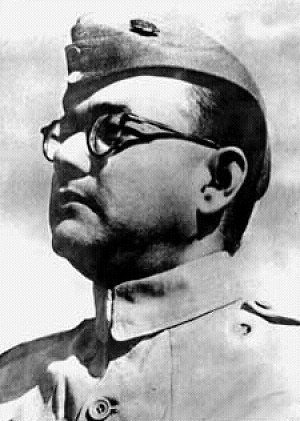Indian History
Azad Hind Formation Anniversary
- 23 Oct 2021
- 5 min read
Why in News
The anniversary of the formation of the Azad Hind Government is celebrated on 21st October every year.
- The day marks the announcement of India's first independent provisional government named Azad Hind Government.
Key Points
- On 21st October 1943, Subhash Chandra Bose announced the formation of the Provisional Government of Azad Hind (Free India) in Singapore, with himself as the Head of State, Prime Minister and Minister of War.
- The Provisional Government not only enabled Bose to negotiate with the Japanese on an equal footing but also facilitated the mobilisation of Indians in East Asia to join and support the Indian National Army (INA).
- The struggle for independence was carried on by Subhash Chandra Bose from abroad. He found the outbreak of the Second World War (1939-45) to be a convenient opportunity to strike a blow for the freedom of India.
- Bose had been put under house arrest in 1940 but he managed to escape to Berlin on 28th March, 1941. The Indian community there acclaimed him as the leader (Netaji). He was greeted with ‘Jai Hind’ (Salute to the motherland).
- In 1942, the Indian Independence League was formed and a decision was taken to form the Indian National Army (INA) for the liberation of India.
- On an invitation from Ras Bihari Bose, Subhash Chandra Bose came to East Asia on 13th June, 1943. He was made president of the Indian Independence League and the leader of the INA popularly called ‘Azad Hind Fauj’.
- The INA was first formed under Mohan Singh and Japanese Major Iwaichi Fujiwara and comprised Indian prisoners of war of the British-Indian Army captured by Japan in the Malayan (present-day Malaysia) campaign and at Singapore.
- In November 1945, a British move to put the INA men on trial immediately sparked massive demonstrations all over the country.
- He gave the famous battle cry ‘Chalo Dilli’. He promised independence to Indians saying, ‘tum mujhe khoon do, main tumhe Azadi dunga’ (You give me blood, I will give you freedom).
Subhash Chandra Bose
- Birth:
- Subhas Chandra Bose was born on 23rd January 1897, in Cuttack, Orissa Division, Bengal Province, to Prabhavati Dutt Bose and Janakinath Bose.
- His Jayanti is celebrated as 'Parakram Diwas' on 23rd January.
- Subhas Chandra Bose was born on 23rd January 1897, in Cuttack, Orissa Division, Bengal Province, to Prabhavati Dutt Bose and Janakinath Bose.
- Education and Early Life:
- In 1919, he had cleared the Indian Civil Services (ICS) examination. Bose, however, resigned later.
- He was highly influenced by Vivekananda's teachings and considered him as his spiritual Guru.
- His political mentor was Chittaranjan Das.
- He worked as the editor for Das’s newspaper, Forward, and later started his own newspaper, Swaraj.
- Association with Congress:
- He stood for unqualified swaraj (independence), and opposed the Motilal Nehru Report which spoke for dominion status for India.
- He actively participated in the Salt Satyagraha of 1930 and vehemently opposed the suspension of Civil Disobedience Movement and signing of the Gandhi-Irwin Pact in 1931.
- In the 1930s, he was closely associated with left politics in Congress along with Jawaharlal Nehru and M.N. Roy.
- Bose won the congress presidential elections at Haripura in 1938.
- Again in 1939 at Tripuri, he won the presidential elections against Gandhi's candidate Pattabhi Sitarammayya. Due to ideological differences with Gandhi, Bose resigned and left congress. Rajendra Prasad was appointed in his place.
- He founded a new party, 'the Forward Bloc'. The purpose was to consolidate the political left and major support base in his home state Bengal.
- Death:
- He is said to have died in 1945 when his plane crashed in Taiwan. However, there are still many conspiracy theories regarding his death.







